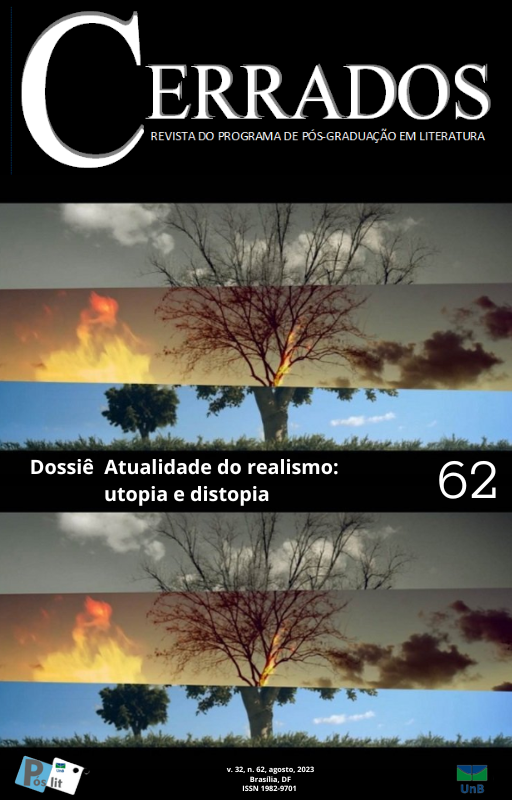Enactment of the fascinationa with evil
A reading of A nova ordem, by B. Kucinski
DOI:
https://doi.org/10.26512/cerrados.v32i62.44151Keywords:
A nova ordem, Dystopia, Banality of evil, Eternal fascism.Abstract
This article makes a reading of the novel A Nova Ordem (2019), by Bernardo Kucinski, analyzing the characteristics of dystopia that proposes new paths of progress for Brazil. As is typical of this literature, the analysis of the text provokes feelings of repulsion for the actions and beliefs of the characters, but also reveals a Brazil of reality that seems very possible to happen. Everything in the fictional text passes through our eyes as if it were. In this way, the novel set in Brazil has naked characteristics of fascista uthoritarianism, but also reports, in many topics, the reality of the country that seems to be surrounded by a dictatorial aura. The retakes, present in the narrative, of laws and agencies, part of the Brazilian reality, reinforce this impression of insecurity, typical of the genre. In addition, as the characters and lines of the plot configure dictatorial actions and consciences, we highlight Hannah Arendt's (1999) understanding of the banality of evil to support the reading, in order to analyze discursive configurations that punctuate the bureaucratic character of the practice of exclusion, expulsion and death of the elect as others, therefore, undesirable and we resume the fourteen characteristics of fascism, contributions of Umberto Eco, in the text Fascismo eternal (2019).
Downloads
References
ADORNO, Theodor. Arte, sociedade e estética. In. Teoria Estética. Trad. Artur Mourão. Lisboa: Edições 70, 1988. Pp 11 – 27 (Coleção Arte e Comunicação)
BENJAMIN, Walter. Magia e técnica, arte e política. Trad. Sergio Paulo Rouanet. 7ed. São Paulo: Brasiliense, 1994. v1. pp 222 - 232
BOBBIO, Norberto; MATTEUCCI, Nicola; PASQUINO, Gianfranco. Dicionário de política. Tradução de Carmen C. Varriale, Gaetano Lo Mônaco, João Ferreira, Luís Guerreiro Pinto Cacais e Renzo Dini. Brasília: Editora Universidade de Brasília, 1ª ed., 1998.
CHAUÍ, Marilena. Notas sobre Utopia. Revista Artigos e Ensaios. Acessado em http://cienciaecultura.bvs.br/pdf/cic/v60nspe1/a0360ns1.pdf. 07/02/2021
ECO, Umberto. O fascismo eterno. Trad. Eliana Aguiar. 3ed. Rio de Janeiro: Record, 2019.
GENNETE, Gérard. Discurso da narrativa. Lisboa: Veja, 1995.
KUCINSK, Bernardo. A Nova Ordem. São Paulo: Alameda, 2019.
KUCINSK, Bernardo. K. Relato de uma busca. São Paulo: Alameda, 2019.
Hilário, Leomir Cardoso. Teoria crítica e literatura: a distopia como ferramenta de análise radical da modernidade. Anu. Lit., Florianópolis, v.18, n. 2, p. 201-215, 2013. ISSNe 2175-7917.
RICOEUR, Paul. Tempo e Narrativa: 3 o tempo narrado. São Paulo: Editora WMF Martins Fontes, 2010.
Downloads
Published
How to Cite
Issue
Section
License
Copyright (c) 2023 Revista Cerrados

This work is licensed under a Creative Commons Attribution 4.0 International License.
Proibida a reprodução parcial ou integral desta obra, por qualquer meio eletrônico, mecânico, inclusive por processo xerográfico, sem permissão expressa do editor (Lei n. 9.610 de 19/2/1998 )



